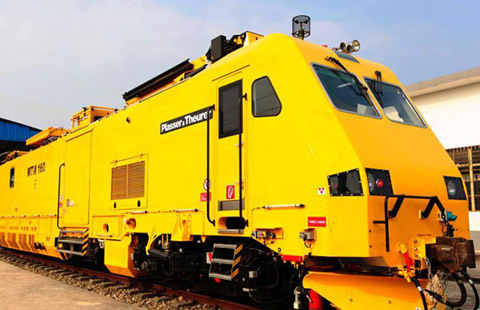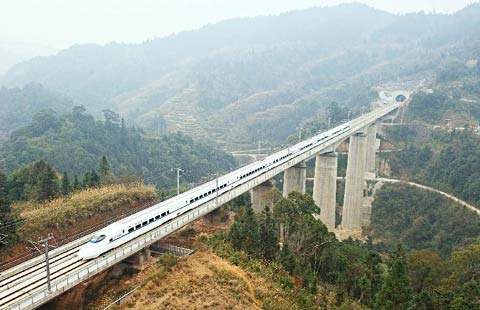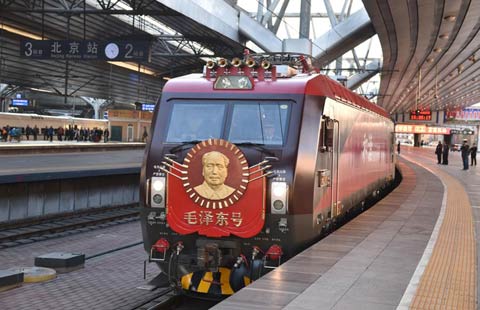High speed rail brings development opportunities to western interior
(Xinhua) Updated: 2014-12-27 10:59Brighter future
Wang Yuanlai, head of Ping'an County in Qinghai, said: "The high-speed railway will help western regions monetize their natural resources and will bring industrial advantages with it."
According to Xinjiang's development and reform commission, due to human traffic swapping to the new railway, freight volume on the old Lanxin railway will increase, to 150 million tons a year compared to 78.5 million tons in 2013.
Director of the tourism bureau of Datong Hui and Tu Autonomous County in Qinghai, Sun Jing, said the Qinghai-Tibet Plateau will see a tourism boom thanks to the new Lanxin high speed line.
"The new network will bring more tourists to the region," he said, adding that in the past, travel around the area was difficult and time-consuming.
The Lanxin railway, which follows part of the ancient Silk Road route, is also expected to play a key role in the Silk Road Economic Belt program by boosting cooperation with central and western Asian nations.
"It will allow livestock, Tibetan blankets, dresses and other products to be shipped to Central Asia and Europe," said Wei Xiaojun, who works at the Xining City customs department.
Researcher with the Guizhou Academy of Social Sciences, Huang Yong, said the Guiguang high speed railway will facilitate the transfer of technology and experience from eastern coastal areas to the southwestern interior.
A modern legend
China has achieved a string of high-speed railway mileage and technological milestones and boasts more than 10,000 km of high speed railway lines.
The Gobi Desert, which the Lanxin high speed railway crosses, had long been a technical conundrum for infrastructure projects.
Chief engineer of the railway project, Wang Zhengbang, explained that the area that the line crosses is known for devastating gales, which in the past have caused derailments, so special wind-breaking structures had to be designed.
"It is the first time that technology has been used on such a large scale," Wang said.
Guiguang high-speed railway, which runs through faults, rivers, valleys and downtown areas, has been hailed a "super railway" after its construction team had to overcome many difficulties.
The Karst region, general manager of Guiguang High-Speed Railway Co, Zhang Jianbo, explained was an especially difficult area for construction, due to the area's geology, such as fragile limestone.
Technology developed especially for the Guiguang high speed railway represents another landmark in China's high-speed railway history, and with China's high-speed trains run on five continents, the sector is fast becoming an attractive business magnet for foreign buyers.
- China external debt at $894.8b by September
- China to form final ruling on Qualcomm case
- Volkswagen, Chrysler, GM recall defective vehicles in China
- UnionPay expands overseas to serve tourists
- Non-fossil energy rises in the mix
- Court rejects plea against CSRC decision
- GAC plans expansion in overseas markets
- China's first 'bullet train ambulance' unveiled
















